Macron Calls NATO ‘Brain Dead’ Due To Lack Of U.S. Leadership
French President Emmanuel Macron declared that the NATO alliance is suffering brain death due to President Trump's neglect and lack of leadership.
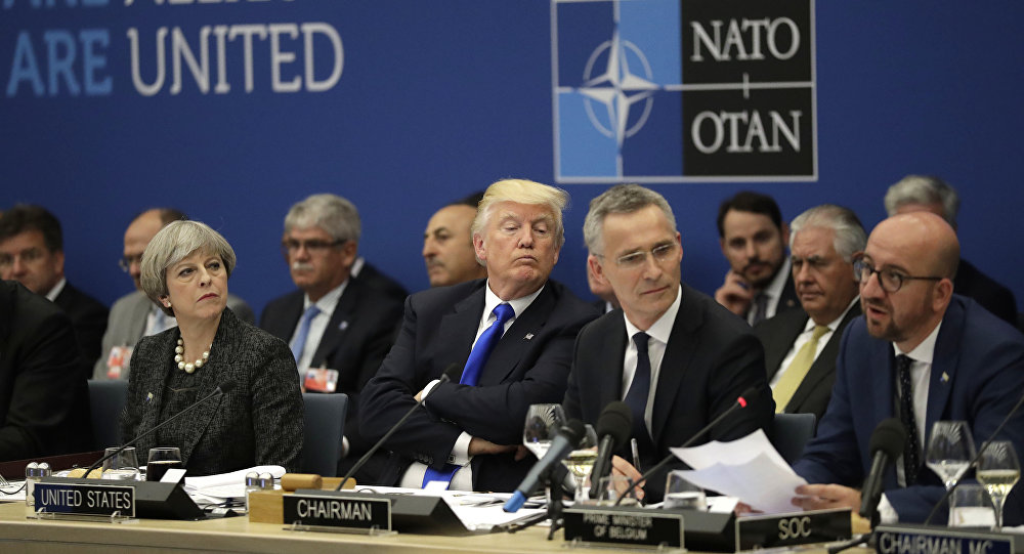
French President Emmanuel Macron took a rather obvious shot at his erstwhile friend Donald Trump to declare that the NATO alliance has been endangered largely thanks to the manner in which the United States has acted since President Trump took office:
French President Emmanuel Macron shocked allies in an interview published on Thursday, saying that he did not know whether NATO’s commitment to collective defense was still valid and that the alliance was experiencing “brain death” because of a lack of strategic coordination and leadership from the United States.
“What we are currently experiencing is the brain death of NATO,” Mr. Macron told The Economist magazine. He said the United States under President Trump appeared to be “turning its back on us,” notably by pulling troops out of northeastern Syria without notice, and he called on Europeans, as he has often done, to do more in their own defense with the aim of “strategic autonomy.”
Chancellor Angela Merkel of Germany responded unusually sharply to what she called Mr. Macron’s “drastic words,” which she does not share. “That is not my point of view,” Ms. Merkel said in Berlin when asked about Mr. Macron’s remarks.
“I don’t think that such sweeping judgments are necessary, even if we have problems and need to pull together,” Ms. Merkel said. “NATO remains vital to our security.”
Asked for his own response, Secretary of State Mike Pompeo praised NATO in the eastern German city of Leipzig, after spending the morning touring the former border that divided East Germany from the West, where he was an officer in the United States Army.
“I think NATO remains an important, critical, perhaps historically one of the most critical strategic partnerships in all of recorded history,” he said.
NATO was crucial to the collapse of the Iron Curtain that divided Europe for decades, he said. It was the cooperation and “remarkable work” of NATO’s democratic partners “that created freedom and brought millions of people out of very, very difficult situations.”
Mr. Pompeo then went on to defend Mr. Trump’s persistent demands that Germany and other allies increase military spending to the NATO goal of 2 percent of gross domestic product.
Foreign Minister Heiko Maas of Germany, with Mr. Pompeo, also rejected Mr. Macron’s characterization. “I do not believe NATO is brain dead,” he said. “I firmly believe in international cooperation.”
NATO leaders will gather in London for an abbreviated summit meeting on Dec. 3 and 4 to mark the alliance’s 70th anniversary. Mr. Macron’s pessimistic views about its future are bound to overshadow the meeting, which was already designed to be brief given Mr. Trump’s own harsh criticism of NATO allies for not spending enough in their own defense.
Mr. Macron also wants Europeans to spend more on defense, but in pursuit of their own strategic goals, in collaboration with NATO but not beholden to it.
His remarks were clearly in response to some of Mr. Trump’s unilateral actions. “You have no coordination whatsoever of strategic decision-making between the United States and its NATO allies. None,” Mr. Macron said.
”You have an uncoordinated aggressive action by another NATO ally, Turkey, in an area where our interests are at stake,” he added. “There has been no NATO planning, nor any coordination.”
Turkey’s military operation against Kurdish forces in northern Syria was opposed by fellow NATO members like France, but made possible by Mr. Trump’s sudden withdrawal of United States forces, against the advice of American officials, after a telephone conversation with President Recep Tayyip Erdogan of Turkey.
NATO functions well in the military sphere, coordinating armies and commands, Mr. Macron said. But “strategically and politically, we need to recognize that we have a problem,” he said. “We should reassess the reality of what NATO is in light of the commitment of the United States.”
All of this, of course, is yet another sign of the extent to which the Trump Administration has driven a wedge between the United States and Europe, and simply another sign that is going to be difficult for the next President, whoever it is and whenever they take office, to repair the damage that this President has done in just two short years. It all began, of course, early in Trump’s Presidency with his first visit to Europe as President that left many European leaders wondering just how committed the President was to the alliance and to its collective defense principles notwithstanding later assurances regarding that commitment on his part. This concern was not out of the blue, of course, since Trump had spent much of his campaign for President attacking the NATO alliance and expressing opinions that made it seem as though he had no understanding how it really worked. In early 2016, for example, The Washington Post quoted the then-candidate as saying that the United States could no longer afford the alliance and suggested that if he were President the United States might not come to the defense of its NATO allies. In March of that year, Trump called NATO “obsolete and expensive” and suggested that its members cannot be relied on to fight terrorism. Trump repeated those comments in April 2016, said that NATO members must pay their “fair share,” and said that “And if it breaks up NATO, it breaks up NATO.” Trump reiterated those comments again in July after winning the Republican nomination officially, something which started raising concerns in Europe notwithstanding the fact that, at the time, it did not appear that he would actually win the Presidency.
Last year, the President shifted his apparent vendetta against Europe and our closest allies from the military and foreign policy realm to the economic realm. In April 2018, for example, the President revoked the exemption from the steel and aluminum tariffs that had been announced the previous month Those exemptions applied to steel and aluminum imports from Europe as well as Canada and Mexico. In doing so, Trump claimed that he was taking this action for “national security” reasons. Objectively speaking, of course, the idea that these allies are a national security threat to the United States, or that we could not rely on them as a source for aluminum and steel in the event of a national emergency or military threat is absurd. Needless to say, this didn’t go over very well with our allies in Europe and elsewhere. Canada’s Foreign Minister called the new tariffs “absurd,” for example, and European Union officials announced retaliatory tariffs against American goods. Things got even more bizarre in this regard as Trump exchanged harsh words with Canadian Prime Minister Justin Trudeau prior to the G-7 Summit. Once he was at the summit, Trump essentially did everything he could to alienate America’s closest allies, thereby seemingly achieving a goal that Russia and, before it, the Soviet Union had only dreamed of, driving a wedge between the United States and its allies. After the Singapore Photo Op Summit, Trump continued his tirade against Trudeau, while polling revealed that Canadian public opinion about the United States was suffering as a result of American actions and the President’s rhetoric. One month later, of course, Trump met with Russian leader Vladimir Putin in Helsinki and proceeded to perform just as obsequiously as he had in Singapore during his summit with North Korean Leader Kim Jong Un. This meeting, of course, came in the wake of a NATO summit that was about as much of a disaster as you would expect it to be under Trump and a trip to the United Kingdom that didn’t go much better.
Given all of this, it’s hardly surprising that our major European allies, and even our friends to the north in Canada would begin to doubt just how much they can rely upon the United States as long as Donald Trump, or someone like him as President of the United States. In stark contrast to previous Presidents who have been careful to keep up at least the public appearance of good relationships with our allies and their leaders even when there were sharp differences of opinion behind closed doors, this President thinks nothing of throwing these allies under the bus even when there is no rational reason to do so. The result of this is that both by his rhetoric and his actions, this President has done everything possible to alienate the United States from its allies and to, as I have said before, achieve the goal that Soviet leaders from Stalin to Gorbachev could only dream about by driving a wedge between the United States and the rest of the Atlantic alliance. It appears that our ostensible allies are getting the message.
It’s in this context that President Macron makes his remarks, of course, and the issues he raises are all well-taken. If what we’ve sen for the past two and a half years continues, then the rift within the alliance will continue to widen and the concerns he raises will become even more common among European leaders already rightfully concerned over exactly what the United States might do next. That benefits only one person and one nation, Vladimir Putin and Russia. This is why Democrats picking their Presidential candidate need to pay more attention to foreign policy than they appear to be at the moment.
The question going forward is whether the damage that this President is doing to our relationship with Europe, NATO, and nearly all of our other allies with the exception of Israel will be reparable by the time he leaves office. To some extent, the damage will hopefully be limited in that the Europeans realize that this is likely just a temporary setback at an unusual time in American history. In that case, they will likely be willing to wait out the coming storm in the hope that whoever replaces Trump will be able and willing to repair the alliances that every President from Truman to Obama had worked so hard to build and sustain. This will be easier, of course, if Trump ends up being a one-term President. If he somehow manages to be re-elected in 2020, then the rift is likely to grow wider and Europe is likely to find itself dealing with the prospect of either having to wait another four years or to assume that the change that Trump represents is more permanent than temporary

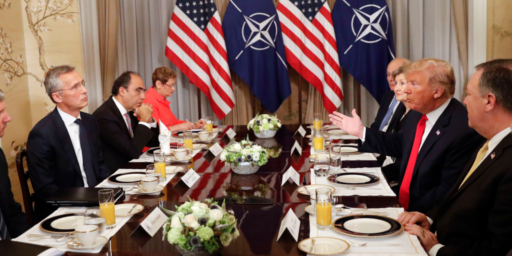
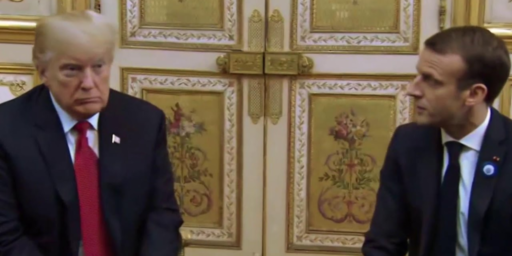
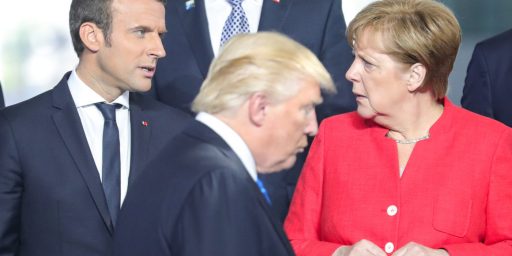
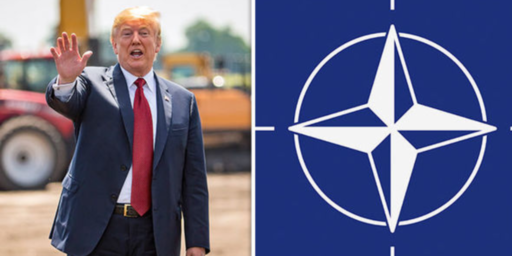

I’ll repeat my comment from Doug’s Eleventh Hour post on the war to end all wars:
It took two World Wars, but we did eventually end war, at least in Europe. And now we’re throwing it away.
I suppose a head of state, and many of their senior staff, can pass through immigration and customs formalities with only a cursory inspection, if any. Meaning any ally requiring any kind of help, can visit the White House carrying one of more discreet briefcases which will be left behind without anyone taking any official notice.
Just be mindful not to include any Euros in said briefcases. That would piss the Orange One off no end.
For better or for worse, I reckon that any dreams of containing China are dead. What country, given the choice, would stand with us knowing that major changes in our policy might be just an election away? On the other hand, I assume that China will remain consistent for years to come.
As for NATO, the EU must be shaken, but is it enough to actually pump significant money into their militaires? Only fools spend US levels of their GNP on weapons.
It will be much more difficult if the next President is a Republican, and thus unable (or at least unwilling) to simply repudiate the actions of the idiot criminal who preceded him.
Trump is easily the best President Russia has ever had.
It may not be that easy.
Let’s say that the next president goes back to status quo ante, and all NATO allies believe this. Well and good. but what’s to prevent the next Republican president from pulling a Trump and sh***g all over the Alliance again? Maybe a more competent person who would intentionally break NATO, or pull the US out altogether?
The Alliance can be fixed, but the trust that existed won’t be fixed for years, if ever.
I appreciate your response, but this story peaked a week ago.
Why push now?
Do you have a new, transformative take?
@de stijl:
I suspect that this is a case of so many stories, so little time. After all, Doug, James and Steven, et al live in the real world and have jobs, families etc. Macron’s statement is important, though not urgent. It shows one more way that we are in the post-American century and the world needs to find a way forward.
@Sleeping Dog:
That is both correct and lame.
The hosts obviously have lives. I have one too. As do you. As do we all.
Macron spoke truth as he saw it. And, for now, I agree.
We are kneecapping NATO purposefully per Trump’s direction. That is a wrong choice perpetuated by professional people who know better.
@de stijl: Except that they don’t know better. They only know to do what they’re told and follow the policy wherever it will take them. The destination is immaterial; the policy is everything.
@Kathy:
I read an op-ed recently that said the same thing. Foreign leaders have learned that any “promises” made by the U.S. are good only during the term of whichever POTUS makes them. When that person leaves office, the “promises” may or may not be kept.
This is the sound way of looking at the situation. If I were a foreign leader, I would never trust a damn thing any POTUS says ever again.
@Sleeping Dog:
Definitely. Even assuming the apocalypse doesn’t happen — and I think that’s a really fragile assumption — the U.S. is no longer a world superpower. This was bound to happen sometime, Trump or no Trump; empires rise and fall. The U.S. wasn’t a superpower from its genesis; it wasn’t one prior to WWII.
Rather than bemoaning the situation or hoping it will magically get better, the rest of the world needs to step up and contain Putin and other threats on their own.
Truly appreciate Macron’s reaction, concern, and behavior. He is responding rationally imo.
Trump is actively trying to degrade NATO. Why?
Even if there is not kompromat pushing this postion forward, this is objectively bad policy for US interests.
There is no other choice other than calling Trump’s foreign policy choices surprisingly amenable to or remarkably aligned with Putin’s desires.
Hopefully the next President is more focused on maneuvers that favor us and justice.
@Nightcrawler:
It wouldn’t be wrong for a new administration to say “this policy from the past administration is not working well to achieve it’s stated objectives, and it’s costs too much to maintain. Therefore we’ll change it.”
It wouldn’t even be completely wrong to say “this policy from the past administration is contrary to our values, therefore we’ll change it.” Though here the policy might be working and thus be worth keeping.
What’s seriously wrong is to say “This policy from the past administration is the past administration’s. therefore we’ll change it.” Here there’s no regard for the results, costs, value-congruence or anything else. It’s not even judged to be wrong, just someone else’s.
To some extent, all politicians do this. But to a larger extent, most politicians judge most existing policies by other measure, like results or even popularity with the voters regardless of results. Trump is unique in having taken a wrecking ball to past policies indiscriminately. not just Obama’s, but long-standing US policies like a commitment to NATO.
@Kathy: Of course. It isn’t a bad thing for a POTUS to overturn a previous administration’s policy that is contrary to U.S. interests, unrealistic to continue, or both. In fact, it is the reasonable and prudent thing to do.
The problem here, as you pointed out, is that the Orange Julius is overturning policies that were in the U.S.’ best interests to continue, including assurances made to our allies.
That’s why the U.S. is no longer a superpower. Not only is it no longer exercising leadership on the world stage, it has also proven itself to be untrustworthy and willing to slit its own throat and bleed out on the floor in an effort to cling to ridiculous “principles”* or prove some absurd point.
* In this case, the driving “principle” is if the Democrats did it/support it, it’s evil and socialist and must be abolished. No grey areas, and no exceptions.